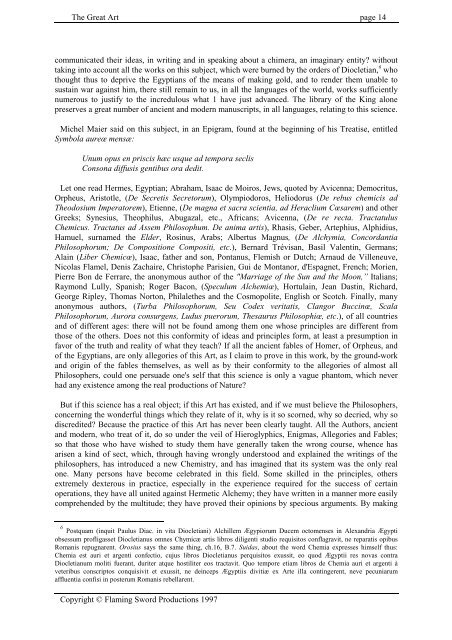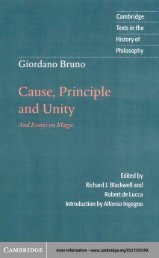The Great Art
Create successful ePaper yourself
Turn your PDF publications into a flip-book with our unique Google optimized e-Paper software.
<strong>The</strong> <strong>Great</strong> <strong>Art</strong> page 14<br />
communicated their ideas, in writing and in speaking about a chimera, an imaginary entity? without<br />
taking into account all the works on this subject, which were burned by the orders of Diocletian, 6 who<br />
thought thus to deprive the Egyptians of the means of making gold, and to render them unable to<br />
sustain war against him, there still remain to us, in all the languages of the world, works sufficiently<br />
numerous to justify to the incredulous what 1 have just advanced. <strong>The</strong> library of the King alone<br />
preserves a great number of ancient and modern manuscripts, in all languages, relating to this science.<br />
Michel Maier said on this subject, in an Epigram, found at the beginning of his Treatise, entitled<br />
Symbola aureœ mensæ:<br />
Unum opus en priscis hæc usque ad tempora seclis<br />
Consona diffusis gentibus ora dedit.<br />
Let one read Hermes, Egyptian; Abraham, Isaac de Moiros, Jews, quoted by Avicenna; Democritus,<br />
Orpheus, Aristotle, (De Secretis Secretorum), Olympiodoros, HeIiodorus (De rebus chemicis ad<br />
<strong>The</strong>odosium Imperatorem), Etienne, (De magna et sacra scientia, ad Heraclium Cœsarem) and other<br />
Greeks; Synesius, <strong>The</strong>ophilus, Abugazal, etc., Africans; Avicenna, (De re recta. Tractatulus<br />
Chemicus. Tractatus ad Assem Philosophum. De anima artis), Rhasis, Geber, <strong>Art</strong>ephius, Alphidius,<br />
Hamuel, surnamed the Elder, Rosinus, Arabs; Albertus Magnus, (De Alchymia, Concordantia<br />
Philosophorum; De Compositione Compositi, etc.), Bernard Trévisan, Basil Valentin, Germans;<br />
Alain (Liber Chemicœ), Isaac, father and son, Pontanus, Flemish or Dutch; Arnaud de Villeneuve,<br />
Nicolas Flamel, Denis Zachaire, Christophe Parisien, Gui de Montanor, d'Espagnet, French; Morien,<br />
Pierre Bon de Ferrare, the anonymous author of the "Marriage of the Sun and the Moon,” Italians;<br />
Raymond Lully, Spanish; Roger Bacon, (Speculum Alchemiœ), Hortulain, Jean Dastin, Richard,<br />
George Ripley, Thomas Norton, Philalethes and the Cosmopolite, English or Scotch. Finally, many<br />
anonymous authors, (Turba Philosophorum, Seu Codex veritatis, Clangor Buccinœ, Scala<br />
Philosophorum, Aurora consurgens, Ludus puerorum, <strong>The</strong>saurus Philosophiœ, etc.), of all countries<br />
and of different ages: there will not be found among them one whose principles are different from<br />
those of the others. Does not this conformity of ideas and principles form, at least a presumption in<br />
favor of the truth and reality of what they teach? If all the ancient fables of Homer, of Orpheus, and<br />
of the Egyptians, are only allegories of this <strong>Art</strong>, as I claim to prove in this work, by the ground-work<br />
and origin of the fables themselves, as well as by their conformity to the allegories of almost all<br />
Philosophers, could one persuade one's self that this science is only a vague phantom, which never<br />
had any existence among the real productions of Nature?<br />
But if this science has a real object; if this <strong>Art</strong> has existed, and if we must believe the Philosophers,<br />
concerning the wonderful things which they relate of it, why is it so scorned, why so decried, why so<br />
discredited? Because the practice of this <strong>Art</strong> has never been clearly taught. All the Authors, ancient<br />
and modern, who treat of it, do so under the veil of Hieroglyphics, Enigmas, Allegories and Fables;<br />
so that those who have wished to study them have generally taken the wrong course, whence has<br />
arisen a kind of sect, which, through having wrongly understood and explained the writings of the<br />
philosophers, has introduced a new Chemistry, and has imagined that its system was the only real<br />
one. Many persons have become celebrated in this field. Some skilled in the principles, others<br />
extremely dexterous in practice, especially in the experience required for the success of certain<br />
operations, they have all united against Hermetic Alchemy; they have written in a manner more easily<br />
comprehended by the multitude; they have proved their opinions by specious arguments. By making<br />
6 Postquam (inquit Paulus Diac. in vita Diocletiani) Alchillem Ægypiorum Ducem octomenses in Alexandria Ægypti<br />
obsessum profligasset Diocletianus omnes Chymicæ artis libros diligenti studio requisitos conflagravit, ne reparatis opibus<br />
Romanis repugnarent. Orosius says the same thing, ch.16, B.7. Suidas, about the word Chemia expresses himself thus:<br />
Chemia est auri et argenti confectio, cujus libros Diocletianus perquisitos exussit, eo quod Ægyptii res novas contra<br />
Diocletianum moliti fuerant, duriter atque hostiliter eos tractavit. Quo tempore etiam libros de Chemia auri et argenti à<br />
veteribus conscriptos conquisivit et exussit, ne deinceps Ægyptiis divitiæ ex <strong>Art</strong>e illa contingerent, neve pecuniarum<br />
affluentia confisi in posterum Romanis rebellarent.<br />
Copyright © Flaming Sword Productions 1997

















